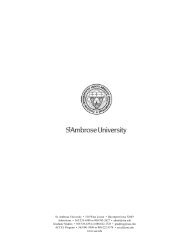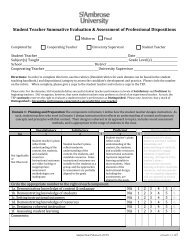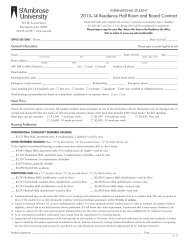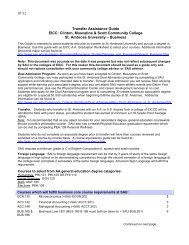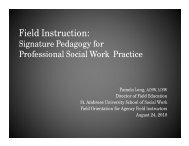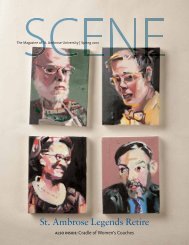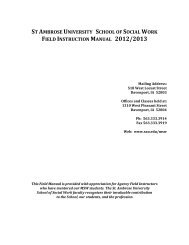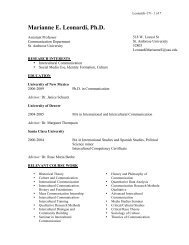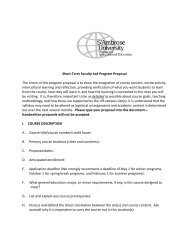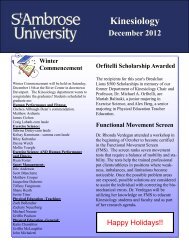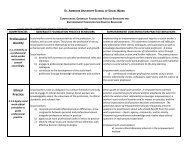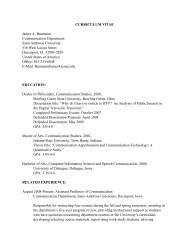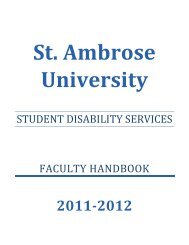St. Ambrose University 518 West Locust Davenport Iowa 52803 admit
St. Ambrose University 518 West Locust Davenport Iowa 52803 admit
St. Ambrose University 518 West Locust Davenport Iowa 52803 admit
You also want an ePaper? Increase the reach of your titles
YUMPU automatically turns print PDFs into web optimized ePapers that Google loves.
Undergraduate Programs<br />
contemporary ritual celebrations. Concentration<br />
on Buddhism, Judaism, early Christianity, Islam,<br />
and Hinduism.<br />
WI-THEO 260. New Directions<br />
In Ministry<br />
3 credits<br />
A foundation course in pastoral theology examining<br />
significant trends taking place within the<br />
Church with regard to ministry, the identity of<br />
ordained and non-ordained ministers, as well as<br />
various forms of collaborative ministry. It stresses<br />
the historical, pastoral, and spiritual foundations<br />
of Christian discipleship, emphasizing a vision of<br />
ministry for the new millennium.<br />
+THEO 300. Contemporary<br />
Theological Issues<br />
3 credits<br />
This course will survey and study examples from<br />
five current movements in theology: ecumenical,<br />
liberation, Black, feminist, and Christian pacifism.<br />
It will focus on how those movements grow<br />
out of and challenge the Christian theological<br />
tradition.<br />
+THEO 301. Jesus Christ: His Person<br />
and Mission<br />
3 credits<br />
<strong>St</strong>udy of Jesus Christ as both divine and human.<br />
Sources of revelation as interpreted by contemporary<br />
systematic theology and psychology.<br />
+THEO 302. Interdisciplinary<br />
Seminar on Peace and Justice<br />
3 credits<br />
This seminar is coordinated by faculty from theology<br />
and philosophy with an instructor from<br />
another discipline often invited to participate.<br />
Part of the interdisciplinary minor in peace and<br />
justice. (Same as PHIL 302)<br />
THEO 303. The Theology of <strong>St</strong>. John 3 credits<br />
John’s theology discovered by a reading and<br />
interpretation of his writings. Prerequisite:<br />
THEO 202 or instructor permission.<br />
+ = Applicable toward general education degree requirements<br />
WI = Writing intensive course<br />
THEO 304. The Theology of the<br />
Synoptic Gospels<br />
3 credits<br />
Major themes and detailed interpretation of the<br />
first three Gospels: Matthew, Mark and Luke.<br />
Prerequisite: THEO 202 or instructor permission.<br />
THEO 305. The Theology of <strong>St</strong>. Paul 3 credits<br />
Pauline theology discovered by a reading and<br />
interpretation of his writings. Application made<br />
to modern religious questions. Prerequisite:<br />
THEO 202 or instructor permission.<br />
+WI-THEO 307. History of Christianity:<br />
Early and Medieval<br />
3 credits<br />
The Church and <strong>West</strong>ern society in the early and<br />
medieval periods. (Same as HIST 307)<br />
+WI-THEO 308. History of Christianity:<br />
Reformation and Modern<br />
3 credits<br />
The Church and society from the Reformation<br />
through the modern age. (Same as HIST 308)<br />
+THEO 309. Prayer, Spiritual<br />
Life and Liturgy<br />
3 credits<br />
Examination of the historical patrimony of writing<br />
on prayer and the spiritual life. Serious attention<br />
is given to the full meaning and process of<br />
growth in holiness. Particular emphasis will be<br />
placed on the eucharistic liturgy as the source<br />
and summit of personal/communal prayer, as<br />
well as authentic ways of celebration.<br />
+THEO 310. Music and Liturgy 3 credits<br />
Introduces liturgical music of the past and present<br />
and gives a practical knowledge of how,<br />
why, and when to use it. Practical experience in<br />
liturgical planning. Prerequisite: Instructor permission.<br />
(Same as MUS 310)<br />
+THEO 311. Environmental Ethics 3 credits<br />
Discusses environmental issues, analyzes the various<br />
philosophical and theological responses, calls<br />
for an evaluation of those responses and challenges<br />
students to draw their own critical conclusions.<br />
Prerequisite: Introductory philosophy or<br />
theology course. (Same as PHIL 311, ENVR 311)<br />
152



